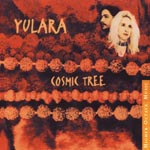|
Yulara
With its debut album, "all is one," the young band Yulara, offers a fresh approach to music that actively reaches from innermost feelings to ecstatic dance grooves.
In the studio and on record Yulara is led by producer and keyboardist Robert Matt with flute player and saxophonist Annie Hilsberg. They weave electronic soundscapes with slow funk rhythms, interact with sampled sounds from nature, spiritual references from world cultures, and improvise on the advanced harmonic structure of American jazz to create an enchanting musical journey.
Yulara means howling of the dingoes. It is also the name of an Australian village near Ayers Rock, full of primordial and spiritual connotations, which is just what Annie Hilsberg and Robert Matt bring out in "all is one": seemingly simple melodic beauty that lures the ears into a spiritual realm where universal truths are spoken with the language of music.
"all is one" is a travelogue for the ears and soul. Beginning in Japan with the ageless chanting of Zen monks on 'Uno Domini,' creating a trance-like state that leads into 'Out Of The Deep,' offering conversation with the humpback whale, the howling of dingoes in the Australian desert.
Hilsberg and Matt work such sounds into their compositions so that the samples, keyboards and reeds become an integrated musical statement, as in 'Out Of The Deep' where Hilsberg uses her flute to play an undersea duet with humpback whales.
It is truly soundtrack music for a peaceful planet. Annie explains, "The musicians who inspire us, whether it's an Australian Aborigine didgeridoo player or Grover Washington, all share something, and that is that it's not about how many notes you play, but finding the right ones. To us the problem with a lot of slower instrumental music is that it only goes for the upper chakras, it only tries to reach the mind. We play for the whole body, including the lower chakras below the waist. Our music is for dancing and lovemaking, too."
They named the album "all is one" because, "We think all over the world we should take down the boundaries and borders. It's stupid to create divisions between races, religions, countries. We are all humans. We should be free of the systems that limit us. We are all striving for the same thing: to find happiness and a better life. Robert and I try to connect the different cultures through the music."
A perfect example of Yulara's effect on listeners came when it staged a concert at the opening of the Peace University in Berlin attended by the Dalai Lama among other dignitaries. Yulara found itself performing for its most enthusiastic dance crowd.
"We played after a day-long conference," Robert Matt recalls, "and while we're used to audiences in clubs taking 15 or 20 minutes before they realize they don't need a faster groove to dance, I've never seen people dancing like that."
"People tell us it's an experience like meditation in that it draws you in, that it's got an inner energy. When you get out of the relaxed state you are so full of energy and power."
It is a long way from the pair's chance meeting as the European members of an African dance band based in Berlin. They came to the band through very different backgrounds and musical education, though both are trained as classical musicians. Robert Matt went to Catholic boarding school until he was 19. "The music was great. We sang Gregorian chants every Sunday." A year in Los Angeles at the Dick Grove School of Music was long enough for him to realize that what he wanted to learn couldn't be taught in music school.
Around the time he returned to Berlin, Hilsberg came back from study at Boston's prestigious Berklee College of Music, where she gained inspiration from such jazz artists as Grover Washington and Herbie Mann, not to mention Maceo Parker, the Who, Pink Floyd and the Meters. She returned to Berlin to complete a master's degree in classical saxophone, but was already looking elsewhere when she joined a Berlin-based African dance band, Saraba. The band was mixing styles from Gambia and Ghana, but on the side Matt and Hilsberg found an affinity for mixing electronic keyboard sequencing with baritone saxophone, the beginnings of their combining technology with tradition.
The pair set up a tiny soundproof recording studio in their small Berlin apartment, often working through the night to get the right mood.
"We wanted to make an album for us because we couldn't find one we wanted to hear already out there."
They experimented with electronic rhythm tracks, over which Hilsberg improvised on sax and flute, taking samples of sounds that carried spiritual depth to them, and weaving them into the mix.
"To us, Yulara is a timeless village of connecting cultures," Hilsberg says. "It doesn't matter if you call it the voice of Buddha, or the Great Spirit, call it by a thousand names and the name is right."
|

